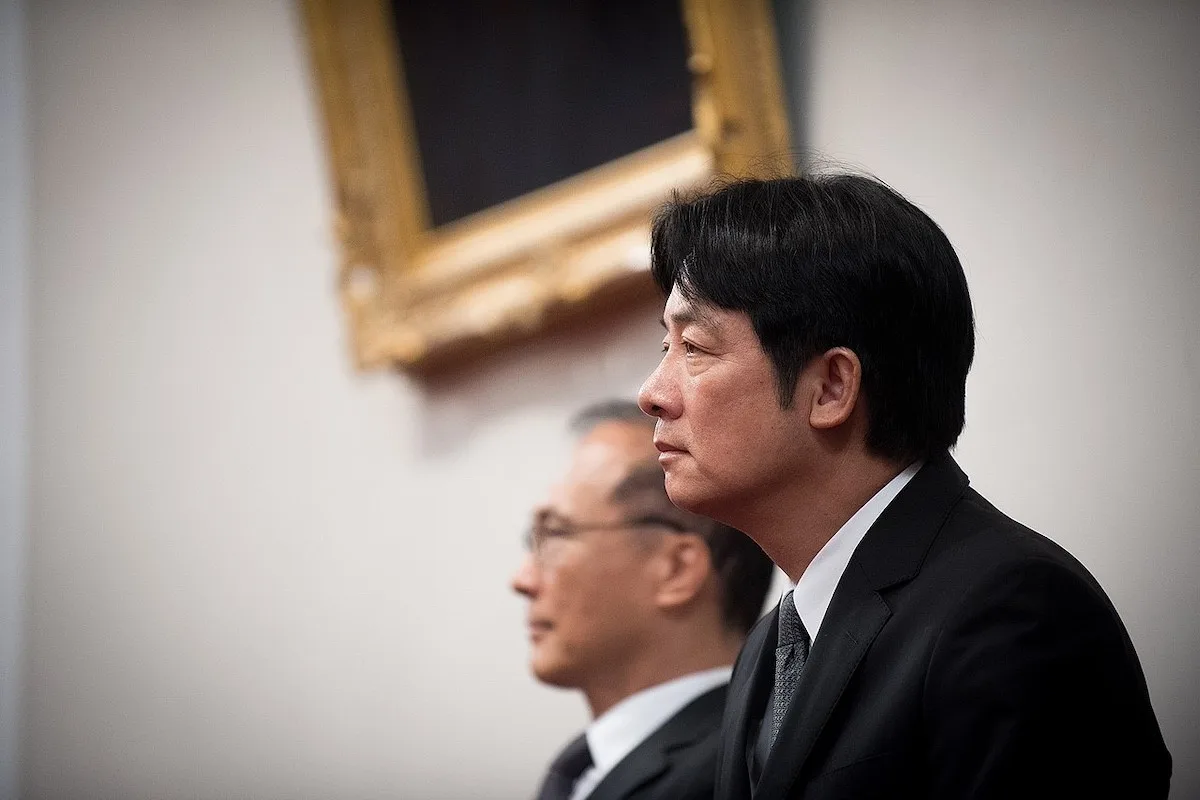Above: Lai Ching-te, the candidate of the ruling Democratic Progressive Party (DPP), is leading in the polls ahead of Taiwan’s elections later this month.
(Image via Wikimedia Commons)
Jan 5, 2024
Polls show the candidate least friendly to Beijing ahead as voters prepare to select Taiwan’s next leader later this month.
Above: Lai Ching-te, the candidate of the ruling Democratic Progressive Party (DPP), is leading in the polls ahead of Taiwan’s elections later this month. (Image via Wikimedia Commons)
While Americans fix their eyes on Iowa ahead of the caucus there on Jan. 15, signaling the official start of the US election season, in Taiwan voters are preparing for an election that could dramatically reshape the geopolitical landscape.
With the candidate least friendly to Beijing ahead in most polls, experts warn the outcome could worsen already tense US-China relations.
The most recent polling, the last allowed before the January 13 election, has Lai Ching-te, the candidate of the ruling Democratic Progressive Party (DPP), ahead of his two major rivals, who have portrayed Lai as a supporter of Taiwan independence, though he has tried to soften this image.
A declaration of independence by Taiwan is widely seen as a likely trigger for military action by Beijing, which claims Taiwan as its own.
One poll, by the United Daily News, a newspaper in Taiwan and the parent of the Chinese language newspaper World Journal in the U.S., has Lai with 32% support, five percentage points ahead of rival Hou Yu-ih of the major opposition party Kuomintang (KMT), and 11 points ahead of Ko Wen-je of the Taiwan People’s Party (TPP).
According to the World Journal, the poll was based on responses from 1,215 voters between Dec. 16 to Dec. 30. Other polls had Lai’s lead by as much as 10 points.
Lai only needs a plurality under Taiwan’s electoral system, though he would enter office in a much weaker position than current President Tsai Ing-wen, who won a second term in 2020 as the DPP candidate with 57% of the vote and full control of the legislature.
A wafer-thin victory in the presidential election and failure to control the legislature would open the door to political horse trading between rival parties and Beijing that could undermine Lai’s attempts to govern. Under such a scenario, Beijing would gain greater leverage over Taiwan through a combination of military threats and moves to bolster the opposition.
Taiwan’s is just one of a number of highly significant elections this year in what some are calling a global litmus test for democracy. Voters in India, Mexico, Russia and South Korea, to name just a few countries, will also be heading to the polls in coming months.
Taiwan has long been a major flashpoint when it comes to US-China ties and was a key issue when U.S. President Joe Biden and Chinese President Xi Jinping met in San Francisco in November. While Biden reassured Xi that the U.S.’ One China policy – which recognizes Beijing as the sole legitimate government of China – has not changed, Xi reportedly told Biden that Beijing is determined to reclaim Taiwan although there is no set timetable.
Analysts broadly agree that a declaration from Taiwan of formal independence would break the delicate balance over the Taiwan Strait, triggering Beijing to seize Taiwan that could drag the U.S. into a war with China. Lai’s party, the DPP, is friendly to the U.S. and maintains a tough stance toward Beijing. President Tsai’s meeting with then Speaker of the U.S. House of Representatives Nancy Pelosi in August 2022 prompted Beijing to launch a simulation of a military blockade of the island, sending U.S.-China relations to a new low.
Lai, who has called himself a “pragmatic worker for Taiwan independence” in the past, has tried to soften his tone during the campaign. The World Journal reported that while being questioned by his rivals during a TV debate on December 30, Lai tried to offer a less inflammatory definition of Taiwan independence – Taiwan’s sovereignty and independence belong to its 23 million people, not the People’s Republic of China, he said.
Beijing doesn’t seem convinced, at least not officially.
Another story from the World Journal noted on the reaction from Chen Binhua, a spokesperson for China’s State Council Taiwan Affairs Office. Lai is promoting the theory of “two Chinas,” revealing his true face as a “worker for Taiwan independence,” Chen said.
Chen called for Taiwanese to make the right choice between “war and peace” and “prosperity and decline.”


